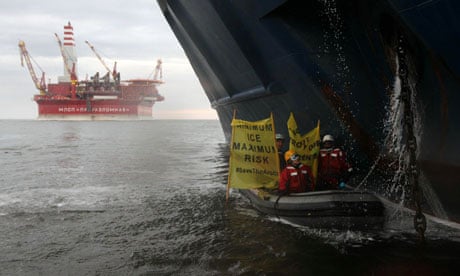After months of delays, Russian state-owned oil and gas company Gazprom has announced that the first ever shipment of oil from offshore Arctic waters has begun the journey to Europe.
This is the oil from the rig that the Arctic 30 went to jail for peacefully protesting against. It has been logistically challenging. Extracting even small amounts of oil in extreme Arctic conditions has taken them longer, and cost them more, than the company had planned.
But Gazprom has done it and claims first place in the race to exploit the melting Arctic sea ice for more of the fossil fuels that caused the melting in the first place. It is a defining moment for Vladimir Putin's Russia, heralded with great fanfare as a new source of power and profit for years to come.
Thankfully, most of us recognise the madness of celebrating a new source of fossil fuels in the Arctic. And, just as importantly, the last few months have shown us just how important it is that we cut our dependence on fossil fuels from Kremlin-controlled companies.
The Ukraine crisis has led Europe's leaders to demand an "energy independence" plan. In June this year, EU leaders will meet to decide their approach.
Yet it's not only Russian oil, coal and gas companies that play politics; it's the fossil fuel industry itself. Even as western leaders denounce Gazprom's actions in threatening to cut off gas supplies to Ukraine, Shell is still committed to supporting Gazprom drill for more Arctic oil. Similarly, BP has a 20% stake in the largest Kremlin-controlled oil company Rosneft. As the Financial Times reported this week, BP is at the forefront of companies lobbying ministers not to penalise Russia over the crisis in Ukraine. As Putin tightens his grip in Russia he inevitably tightens the links with BP as well. Rosneft, along with Gazprom, are the chief sources of finance for his government.
And there is another obvious reason we shouldn't be celebrating new Arctic fossil fuels. This week's IPCC report, produced by 1,250 international experts and approved by 194 governments, definitively says we must get off fossil fuels fast. That means only about one-fifth of all fossil fuel reserves can be burned. So we don't need, and cannot afford, new sources of harder to reach fossil fuels, such as Arctic oil.
The first oil to come from the Arctic is symbolic for Putin, but it's also symbolic for the fight against climate change. In the last 30 years we've lost three-quarters of Arctic sea ice volume in summer months. And as oil companies rush in to exploit the shrinking ice, they are also risking environmental disasters in the fragile Arctic environment.
So the question isn't how to get off Kremlin controlled energy; it is how to tackle the political dominance of the fossil fuel industry. This decision is more relevant, more crucial, than ever before in our history. Fossil fuels got us into this mess, they won't get us out of it.
We need politicians to act on already defined and proven ways to get off fossil fuels. Instead of seeking to fight fire with fire, EU leaders should ensure future energy security by reducing our dependence on ever more extreme oil and gas sources – including from the Arctic. If we follow this plan we can strike a blow against climate change, spark new jobs and industries, and gain real energy security.
